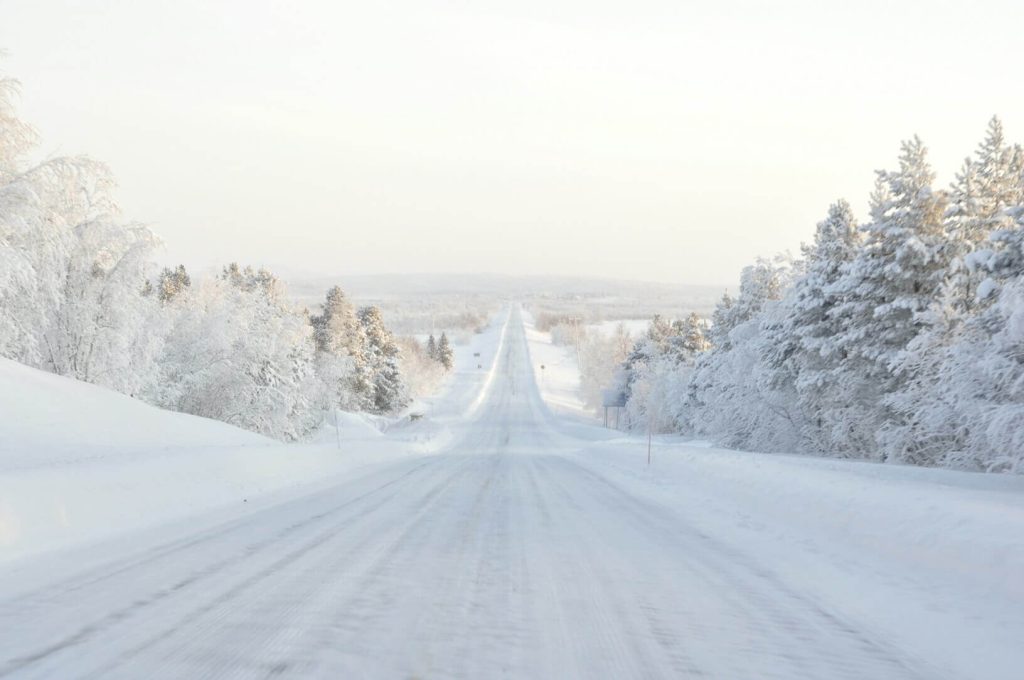
They call Alaska ‘the last frontier’ with very good reason. Plenty of good reasons, actually.
With perilous ice roads, thousands of miles of lonely highways, teeth-chattering minus 40° temperatures, and the occasional suicidal moose to contend with, Alaska is certainly not a job for the faint-hearted when it comes to truck driving.
Make no mistake about it – trucking in Alaska is a tough gig.
By the same token, trucking in Alaska is very well paid, mercilessly free of roadworks or congestion, and there is lots of work. It’s a hard job, but many truckers absolutely love working in The Great Land and wouldn’t have it any other way.
The Land of the Midnight Sun
However, we noticed that the subject of truck driving in Alaska isn’t especially well covered. Being the thoughtful folks that we are here at Truck Parking Club, we decided a quick blog post might be useful to anyone considering becoming a truck driver in Alaska.
Or rather, the challenges associated with truck driving in Alaska. You are already aware of the region’s sheer beauty and that it pays very well (generally speaking), so the purpose here is to cover the issues you might face when you are out there.
So here it is. The Truck Parking Club guide to the challenges of driving in Alaska.
But first, let’s just break down where you are likely to find yourself trucking in Alaska.
Truck Driving Alaskan Highways
Alaska’s huge territory consists of over 14,000 miles of public roads, winding through breathtaking national parks, challenging terrains, and far-flung isolated communities.
The roads are usually narrow and often without shoulders, requiring constant attentiveness, expertise, and dogged resilience. Trucking in Alaska is certainly not something you should ever underestimate.
However, drivers are blessed with more relaxed HOS regulations of up to 20 hours per shift, owing to the severe lack of accessible truck parking in Alaska (more on that below).
The majority of truck drivers in Alaska will find themselves using the following roads and highways for the most part.
ALASKA HIGHWAY
Originally a rugged wilderness route, the Alaska Highway stretches over 1,500 miles from Dawson Creek to Delta Junction in Alaska. This is a commonly used highway, mostly used for transporting essential supplies from the United States to various Alaskan destinations.
DENALI HIGHWAY
Linking Paxson and Cantwell, the 136-mile Denali Highway is another critical road for cross-state transportation. This highway is actually closed each winter, so a little extra planning and adaptability might be required during the off-season.
KUSKOKWIN ICE ROAD
An absolute feat of genius civil engineering, this 300-mile ice road covers 17 remote towns and provides vital access to oil fields during winter. Built entirely on ice, this road is a remarkable lifeline for seasonal cargo transportation – without impacting the Arctic environment in any way.
DALTON HIGHWAY
Spanning over 400 miles, the Dalton Highway is another crucial link to Alaska’s oil fields. This world-famous gravel road runs alongside the Trans-Alaska Pipeline and is restricted from public access at all times. This is a key route for Alaskan truck drivers heading to the northernmost regions.
SEWARD HIGHWAY
Known for its awe-inspiring scenic views, the Seward Highway begins in the harbor city of Seward before stretching out to Anchorage, Alaska’s largest city.
NOME ROAD SYSTEM
While inaccessible by road from outside, Nome boasts over 300 miles of roads and is used mostly for delivering goods to remote communities within the region.

Common Challenges of Truck Driving in Alaska
- Extreme Weather: Drivers often navigate through harsh weather conditions, including heavy snowfall, ice, and extremely low temperatures. Driving can be quite hazardous at times.
- Isolated Routes: Many routes in Alaska are isolated with limited access to amenities, requiring drivers to be self-sufficient and well-prepared for emergencies.
- Wildlife Hazards: Encounters with wildlife – especially moose and bears – can be a serious threat, leading to potential accidents and delays.
- Limited Daylight: In winter, Alaska experiences very limited daylight hours, challenging drivers to navigate in darkness for extended periods.
- Road Conditions: Alaska’s roads can be treacherous, with unpaved, gravel, or icy surfaces demanding high levels of driving skill and concentration.
- Long Distances: Vast distances between destinations can lead to fatigue and require careful time management, especially with relaxed HOS regulations.
- Communication Issues: Remote areas often lack cell phone reception, posing challenges in communication and access to emergency assistance.
- Load Security: Securing loads is critical, especially on rugged terrains and ice roads, to prevent cargo from shifting or falling.
- Mechanical Failures: The extreme cold can lead to frequent mechanical issues, requiring drivers to have basic repair skills and tools.
- Health Challenges: The physical and mental strain of driving under such conditions can impact drivers’ health, necessitating regular checks and breaks.

Truck Parking in Alaska
Last but by no means least, adequate truck parking in Alaska is one of the more commonly shared issues among drivers. With a severe lack of rest areas and truck stops in this beautiful but remote region, finding suitable truck parking spots can be quite stressful.
But we can help.
At Truck Parking Club, we have a wide range of convenient truck parking spots in Alaska, all available to book in advance or up to the very last minute.
It’s simple, hassle-free, and takes a load off your mind knowing you have a great parking spot in Alaska at the end of a long day. From single spaces on private land to huge rest areas, Truck Parking Club has spaces all over America at an affordable price.
Just use our app to browse for truck parking in Alaska, reserve your preferred spot, and arrive. That’s all there is to it! We didn’t just make it affordable – we made it incredibly user-friendly and simple, too.
Come and rest comfortably with the Truck Parking Club by signing up today. We can’t wait to see you.
The information published herein is for general informational purposes only. Truck Parking Club does not make any representations or warranties about the completeness, reliability, legality, and accuracy of this information. Any reliance placed on such material is strictly at the user’s own risk. Truck Parking Club shall not be responsible for any losses or damages incurred in connection with the information published herein.





